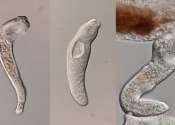Researchers record first-ever images and data of a shark being struck by a boat
Hours after tagging an endangered basking shark off the coast of Ireland in April, researchers captured what they believe is the first ever video of a shark or any large marine animal being struck by a boat.









